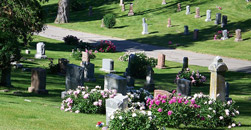A year on, Martin McGuinness's legacy still provokes mixed reaction
Apr 10, 2018Perched high on the Creggan hillside, the headstones in the City Cemetery look down over Derry and its landmarks – the River Foyle, the city walls, and the Bogside. In the last year another monument has been added to their number, a Celtic cross marking the grave of Martin McGuinness. The butcher boy from the Bogside who became an IRA commander, Sinn Féin politician and Northern Ireland’s deputy first minister now lies overlooking the same streets where he grew up, and where he made his name. His death, a year ago, was marked by 25,000 mourners in a ceremony described as being as close to a state funeral as Derry has ever seen. In the months since, his presence has been often missed. One of the last public events McGuinness attended was a service in January 2017 in memory of the dead of Bloody Sunday: “He hugged nearly everybody at the monument,” says Tony Doherty from the Bloody Sunday Trust. “When we gathered again this January his absence was felt very badly. We were all talking about him not being there,” says Doherty.In the months since, McGuinness’s son Fiachra has often taken his father’s place – holding his placard at the Republican Easter Commemoration, and opening the new Museum of Free Derry. His party, too, have ensured that McGuinness snr remains an ever-present influence, invoking his name after election victories and at public events. In the Diamond, in the centre of the city, a banner bearing his image invites people to sign up for the Chieftain’s Walk – “Siúlóid an Taoisigh” – to Grianan Fort, the former seat of the Kings of Ulster, in his memory. Long traditionFor McGuinness’s neighbour, the veteran civil rights campaigner and journalist Eamonn McCann, the eulogies paid to the dead leader and his deliberate recasting in the mould of an Irish chieftain are in keeping with a long Republican tradition. “This is the classic iconography you get from political groups,” he says. “It is absolutely striking how quickly Sinn Féin began talking about Martin in the way almost... (Irish Times)



